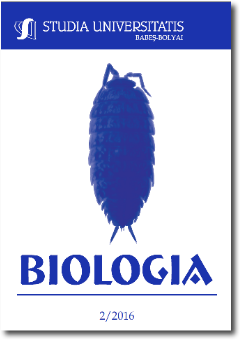Effects of glycerol on “in vitro”-grown “Amaranthus retroflexus” L.
Keywords:
Amaranthus retroflexus, callus, glycerol, morphogenesis.Abstract
Our experiments used a robust plant species (Amaranthus retroflexus), that grows on various types of substrate and in a variety of stress conditions (drought, frost, flooding, etc.) to test its survival on culture media with glycerol as a substitute of sucrose. After aseptic seed germination, plantlets were grown on a calus induction culture medium (Gamborg basal medium enriched with NAA and kinetin). The non-morphogenetic calus was cultured on four culture media with ascending glycerol concentration replacing sucrose as a carbon source. The survival and the growing rate of the caluses are factors that lead to the conclusion of succesful degradation of glycerol by A. retroflexus. Further biochemical analyses will reveal the biodegradation pathways and the secondary compounds production.
References
Bennici, A., Schiff, S., Bovelli R. (1992) In vitro culture of species and varieties of four Amaranthus L. species, Euphytica 62(3), 181-186
Chen, X. S., Ren, X. D., Dong, N., Li, S., Li, F., Zhao, F. L., Tang, L., Zhang, J. H., Mao, Z. G. (2012) Culture medium containing glucose and glycerol as a mixed carbon source improves ε-poly-L-lysine production by Streptomyces sp. M-Z18, Bioprocess Biosyst. Eng., 35(3), 469-75
Ciocârlan, V. (2009) Flora ilustrată a României. Pteridophyta et Spermatophyta, Ceres, Bucureşti, pp. 241-245
Flores Hector, E., Thier, A., Galston, A. W. (1982) In Vitro Culture of Grain and Vegetable Amaranths (Amaranthus spp.), American Journal of Botany 69(7), 1049-1054
Gallagher, R. S., Cardina, J., (1997) Soil water thresholds for photoinduction of redroot pigweed germination, Weed Science, 45(3), 414-418
Gamborg, O. L., Miller, R. A., Ojima, K. (1968) Nutrient requirement of suspensions cultures of soybean root cells, Exp. Cell Res., 50(1), 151-158
Harsha-Vardhana, S., (2011) In vitro antibacterial activity of Amaranthus spinosus root extracts, Pharmacophore 2(5), 266-270
Stasiak Rózanska, L., Błazejak, S., Gientka, I. (2014) Effect of glycerol and dihydroxyacetone concentrations in the culture medium on the growth of acetic acid bacteria Gluconobacter oxydans ATCC 621, Eur. Food Res. Technol., 239, 453–461
Marten, G. C., Andersen, R. N. (1975) Forage nutritive value and palatability of 12 common annual weeds, Crop Science, 15(6), 821-827
McLachlan, S. M., Murphy, S. D., Tollenaar, M., Weise, S. F., Swanton, C. J. (1995) Light limitation of reproduction and variation in the allometric relationship between reproductive and vegetative biomass in Amaranthus retroflexus (redroot pigweed), Journal of Applied Ecology, 32(1), 157-165
Moyer, J. R., Hironaka, R. (1993) Digestible energy and protein content of some annual weeds, alfalfa, bromegrass, and tame oats, Canadian Journal of Plant Science, 73(4),1305-1308
Murashige, T., Skoog, F. (1962) A revised medium for rapid growth and bio assays with tobacco tissue cultures, Physiologia Plantarum, 15, 473–497
Oryokot, J. O. E., Murphy, S. D., Thomas, A. G., Swanton, C. J. (1997) Temperature- and moisture-dependent models of seed germination and shoot elongation in green and redroot pigweed (Amaranthus powellii, A. retroflexus), Weed Science, 45(4), 488-496
Ozsoy, N., Yilmaz, T., Kurt, O., Can, A., Yanardag, R. (2009) In vitro antioxidant activity of Amaranthus lividus L., Food Chemistry 116(4), 867–872
Pammel, L. H. (1903) Some Weeds of Iowa, Experiment Station, Iowa State College of Agriculture and the Mechanic Arts, pp. 470
Stevens, O. (1957) Weights of seeds and numbers per plant, Weeds, 5, 46-55
Weaver, S. E., McWilliams, E. L. (1980) The biology of Canadian weeds. 44. Amaranthus retroflexus L., A. powellii S. Wats. and A. hybridus L., Canadian Journal of Plant Science, 60(4), 1215-1234
Downloads
Published
How to Cite
Issue
Section
License
Copyright (c) 2016 Studia Universitatis Babeș-Bolyai Biologia

This work is licensed under a Creative Commons Attribution-NonCommercial-NoDerivatives 4.0 International License.





